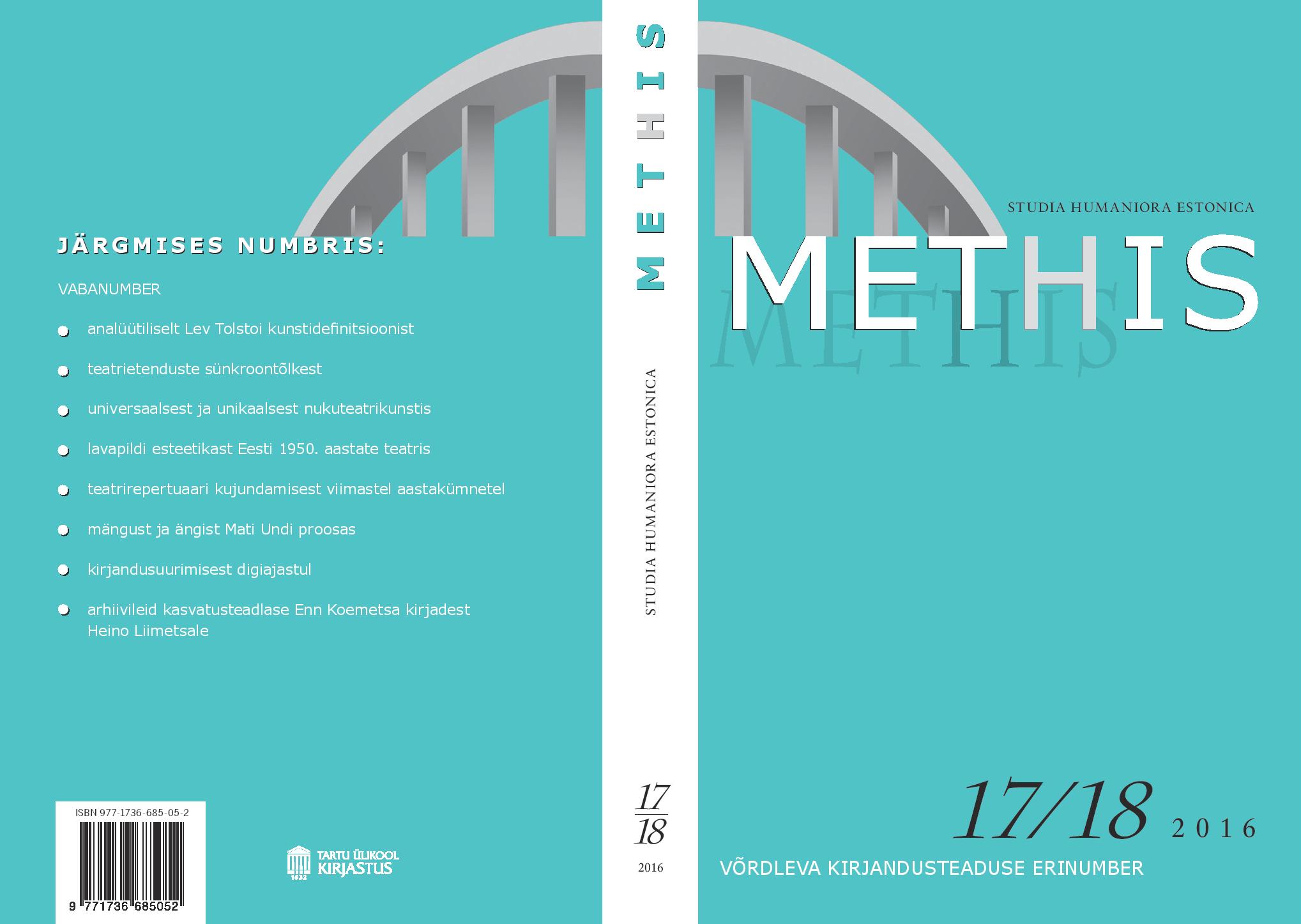Euroopa-ihalusest taasiseseisvusperioodi autobiograafiates / European Identifications in Post-Soviet Estonian Life Writing
DOI:
https://doi.org/10.7592/methis.v14i17/18.13217Keywords:
Euroopa-identiteet, eesti elulookirjandus, 2000-ndad, Jaan Kross, Jaan Kaplinski, Tõnu Õnnepalu, European identity, Estonian life-writing, 2000-sAbstract
Teesid: Artikkel käsitleb Euroopat kui identiteedi ja minaduse sõlmpunkti ja enesevahenduse mõõdet kolmes omaelulookirjutuslikus teoses, mille autoritel on väljapaistev positsioon eesti (kirjandus)kultuuris: Jaan Krossi „Kallid kaasteelised“ (2003a, 2008), Jaan Kaplinski „Isale“ (2003) ja Tõnu Õnnepalu „Flandria päevik“ (2007). Artikkel keskendub sellele, kuidas küsimused suhestumise trajektooridest Euroopa mäluruumiga haakuvad Krossi, Kaplinski ja Õnnepalu teostes esiletuleva enesemääratlusliku raamiga, neist lähtuvate vastastikuse kõnetuse võimaluste ja oma aegruumi tunnetuse pidepunktidega. Kuigi tegemist on eesti keeles ilmunud ning eesti kultuuriruumi lugejale suunatud teostega, seostuvad neis väljajoonistuvad enesemääratluse teljed viimastel aastakümnetel hoogustunud laiemate aruteludega ühtse Euroopa mäluraami ning identiteedi võimalikkusest ja selle toimimise tingimustest.
In recent years, the question of the possibility of a shared frame of memory and identity in Europe, its desired manifestations and practices for attaining it as well as its obstacles and limitations to it have gained prominence in scholarly debates in a number of disciplines. In terms of the division between the East and West of Europe, these discussions take as their starting point the collapse of the Soviet system in 1989 as well as the European Union enlargement in 2004. Far from uniform, the exceedingly complex and contrasting ranges of arguments have put forward a varied palette of perspectives and suggestions about possible and desirable implications of Europe in different socio-political and cultural configurations. Taking these debates as my starting point, the current article offers an analysis of three life writing works by contemporary Estonian authors and intellectuals, Kallid kaasteelised (Dear Fellow Travellers, 2003, 2008) by Jaan Kross, Isale (To My Father, 2003) by Jaan Kaplinski and Flandria päevik (The Flemish Diary, 2007) by Tõnu Õnnepalu where Europe emerges as a noteworthy if not central aspect of construction of subjectivity and processes of identity/identification. Written in Estonian and therefore not accessible for wider international readership, these life writing works can nevertheless be viewed as negotiating for a position within the space of European memory and narration but also challenging it by asking how and by whom does the conditioning of the shared and the recognition of the specific take place and to what extent does it proceed along the (old) binaries of centre/margin, self/other, East/West. The anecdotal structure of Kross’ monumental and canonic memoir follows the lives of a great number of the author’s ‘fellow travellers’. Although many life stories are narrated primarily in relation to Estonian history, Kross also makes a consistent and self-conscious effort to envision a wider space of existence, most importantly, that of a European space of human agency and interaction. Dear Fellow Travellers proposes a (textual) configuration of Europeanness where the narrating subject is self-conscious both of its authoritative identity-forming position and the limits of that authority that inevitably erode that identity and metaphorically leave open a space of narration for the other. In Jaan Kaplinski’s confessional epistolary address to the author’s Polish father who died in the Gulag shortly after the birth of his son and in Õnnepalu’s semi-fictional diaristic text emerging from an obligation to write during a stay in a writers’ residence in Belgium in Vollezele, the question of subjectivity and (European) identity do not unravel primarily via an emphasis on the ruptures of the period of occupation. Instead, these works engage with questions of Europeanness on a larger and also more volatile frame of the politics of positioning in the contemporary relating to questions of cultural diversity, the local/global relationship and Europe’s simultaneously tight and leaky boundaries. In the work of Kaplinski and Õnnepalu, these boundaries are being drawn and dissolved both on the level of sociopolitical and cultural functioning of Europe but sometimes independently of the larger public processes, via processes of the construction of individual identities as well as via acts of communication and interactions with other people.


